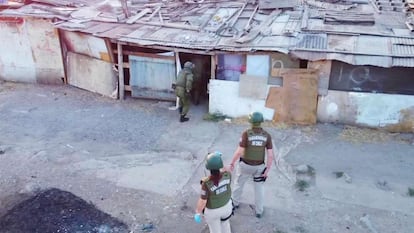Venezuela’s Tren de Aragua gang terrorizes Chile
The criminal organization accused of murdering former soldier Ronald Ojeda was first detected in the South American country three years ago


Tren de Aragua originated in the Tocorón Penitentiary Center in the Venezuelan state of Aragua around 15 years ago. It has since expanded across Latin America, particularly in Peru, Bolivia, Colombia, Brazil, Ecuador and Chile. Now, Chile’s Justice Ministry has accused the criminal organization of involvement in the kidnapping and murder of former Venezuelan soldier Ronald Ojeda in Santiago. Prosecutor Héctor Barros said Tren de Aragua was responsible for the asphyxiation and death of the 32-year-old former lieutenant, whose body was discovered in a buried suitcase in the Maipú area of western Santiago.
Tren de Aragua expanded to Chile in 2021, and has since been implicated in kidnappings, murders, human trafficking, sexual exploitation and torture. Here are the signs of its presence in Chile and the efforts to dismantle the violent criminal organization.
The first sign
About three years ago, Chilean police arrested two Peruvian women in the Tarapacá region of northern Chile. They were carrying ketamine, a drug used to treat severe depression and also use recreationally. The women had crossed the border from Bolivia and claimed they were coerced by the Tren de Aragua to transport the drugs, though this turned out to be untrue. Their statement aided Chilean prosecutors uncover details about the organization.
A business structure
A Chilean police operation last year discovered that Tren de Aragua operates like a business. The gang had purchased a modern bus that traveled from Tarapacá to Coquimbo in the north, carrying 28 irregular migrants and 141 kilos of illegal drugs. The police arrested 11 gang members, and investigations found that the gang had a formally registered bus company that looked legitimate but was used as a front for its various illegal activities.
New types of crime
In recent years, Chile has seen a rise in homicides involving victims with over 15 gunshot wounds, found buried or dumped in the desert, and showing signs of torture. This was a new type of crime for Chile. Tren de Aragua’s arrival in Chile has also led to a rise in the trafficking and sexual exploitation of adolescents and migrant women, particularly Venezuelans. This also led to extortion, drug trafficking, torture and murder when victims fail to make payments.
Kidnappings on the rise
Kidnapping for ransom by transnational gangs has also increased in Chile. According to police (PDI) data, the average number of cases in metropolitan Santiago increased significantly, from an annual average of 6-8 cases to 26 in 2021, 46 in 2022 and 45 by November 2023. One notable kidnapping occurred in Rancagua, a city about 52 miles (85 kilometers) south of Santiago. Wealthy businessman Rudy Basualdo was kidnapped and released 40 hours later after a large ransom was paid. Seven people were subsequently arrested, who Rancagua prosecutor Javier Von Bischoffshausen has linked to a faction known as Los Piratas del Tren de Aragua.
Local cells
Tren de Aragua has expanded through various channels. For instance, a faction called Los Gallegos that originated in Peru now solely operates in Arica, the northernmost part of Chile. In 2023, human remains were found buried in cement on a hill in Arica. This led to the arrests of 38 individuals, primarily Venezuelans, who now await trial for charges including aggravated homicide, migrant trafficking, weapons and drug offenses, as well as exploiting migrant women and engaging in extortion.
Chile’s response
Last year, Congress passed specific legislation to tackle organized crime and confront the changes in the criminal landscape. The laws now divide illicit association into two criminal categories and are also targeting the organizations’ assets. They also updated anti-drug trafficking laws by strengthening seizure capabilities and expanding the reporting of suspicious activities to more government institutions. The Justice Ministry also formed a new Organized Crime and Homicide Team (ECOH).
Sign up for our weekly newsletter to get more English-language news coverage from EL PAÍS USA Edition
Tu suscripción se está usando en otro dispositivo
¿Quieres añadir otro usuario a tu suscripción?
Si continúas leyendo en este dispositivo, no se podrá leer en el otro.
FlechaTu suscripción se está usando en otro dispositivo y solo puedes acceder a EL PAÍS desde un dispositivo a la vez.
Si quieres compartir tu cuenta, cambia tu suscripción a la modalidad Premium, así podrás añadir otro usuario. Cada uno accederá con su propia cuenta de email, lo que os permitirá personalizar vuestra experiencia en EL PAÍS.
¿Tienes una suscripción de empresa? Accede aquí para contratar más cuentas.
En el caso de no saber quién está usando tu cuenta, te recomendamos cambiar tu contraseña aquí.
Si decides continuar compartiendo tu cuenta, este mensaje se mostrará en tu dispositivo y en el de la otra persona que está usando tu cuenta de forma indefinida, afectando a tu experiencia de lectura. Puedes consultar aquí los términos y condiciones de la suscripción digital.








































